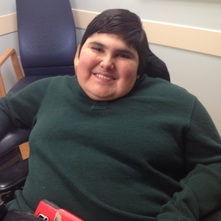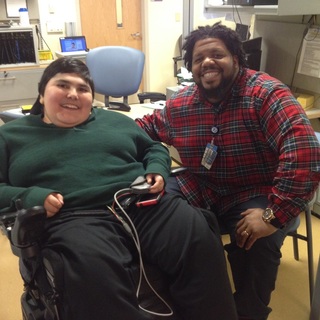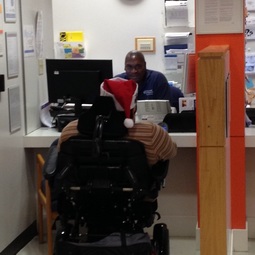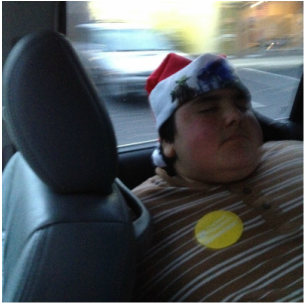
Duchenne clinic days begin early because they are packed with conversation, and our private room door seems to revolve continuously with visitors. We meet with doctors, nurses, technicians, practitioners, interns, and visiting professionals from Neurology, Pulmonary, Cardiology, Endocrinology, Physical Therapy, Rehabilitation, Nutrition, Social Services, and Palliative Care to name a few. Each professional generally seeks the same information but views it with differing and significant perspective. By the end of the day, my head is full and my heart is often wounded with reminders of Duchenne’s stealthy agenda.
This past Thursday begins early at the Duchenne clinic check-in desk, where I electronically sign invisible consent and insurance forms as Alex visits with Kenny, one of the friendly clinic administrators. Kenny’s genuine heart helps to put Alex at ease and starts the day on a good note. I leave the two to their Star Wars discussions and move to the waiting area, where I meet a mother and son from Texas who is attending the Duchenne clinic for the first time (her son is 3 years old). The meeting is brief, but nostalgic, and reminds me of Alex’s first visit in 2002. Alex soon joins the conversation and smiles and laughter are shared between us all.
A little before 8AM, we are called into the clinic and led to a corner private room. Our first visit is with a Neurology nurse who asks the now familiar questions about Alex’s overall health and habits. She is friendly, yet dutiful and fast-typing, as she plows through checklists to share with the doctors before their visit.
Within minutes, Dr. Rutter from Endocrinology enters the room, with a visiting doctor from India who observes silently. Dr. Rutter is wonderful. She has been with Alex for many years and easily handles Alex’s questions and change-of-subject. Her goal is to help manage Alex’s physical growth, which is complicated by years of prolonged steroid use and immobility. Although steroids help with muscle (and, more importantly, heart) strength, they ravage the body with weight gain and decreasing bone health. After a good medical evaluation and Alex’s review of Disney’s Million Dollar Arm with the visiting Indian doctor, Endocrinology leaves and Pulmonary walks into the room. After which, my view of Thursdays is forever changed.
The Pulmonary doctor, Dr. Sawnani, is perhaps Alex’s favorite doctor at Children’s. His ability to relate with kids is unsurpassed and incredible to watch unfold. He is smart, quick-witted, and attentive. He shares jokes and makes kids laugh. But, on this visit, he strikes a different tone, a serious one that immediately grabs our attention and then slowly squeezes the air from our lungs. Through it all, Alex sits stunned and repeatedly reaches for my hand in support as he listens to the doctor he respected most explain his grave concerns. I do my best to listen, support Alex with the squeeze of my hand, and hold my emotion in check. The topic is too serious to miss with tears.
Alex’s pulmonary function continues to slide, decreasing another ten percent over the past six months to nearly a third of what it should be. Dr. Sawnani shares his serious concern, and explains how we must stop this descent or risk prolonged hospital stays for pneumonia at best. He shares he has unfortunately seen it too often, and we are certain to follow if things do not improve. He then takes his concern a step further by telling Alex he needs to stop playing video games late into the night and work to regulate his sleep schedule to more appropriate hours. Dr. Sawnani is convinced this contributes to Alex’s pulmonary decline, because of the toll on his body.
Alex does not understand the seriousness of pneumonia, as I do. But, he DOES understand the loss of video games, and that hurt deep. Dr. Sawnani knows he is the bad cop, and admits as such, but the message is clear and alarming to both Alex and I for differing reasons. Dr. Sawnani then asks me to step into the hallway with him, where he explains that Alex is or near the top of his “concern list” and he cannot wait on regular six month intervals to see him. He changes our visits to bimonthly with option to shorten, if necessary. My heart still hurts just thinking about that conversation.
So, I breathe deep, gather myself, and put on a happy face knowing that tears await when I return to the private room where we left Alex sitting alone. On entry, I indeed find him crying and cradle his head to comfort his emotions (which range from sadness to anger). We don’t have long to discuss what just happened before more doctors soon follow.
In walks Rehabilitation doctors and assistants to listen about home equipment and wheelchair issues, needs, and concerns. Then, the revolving door opens with doctors and interns from Physical Therapy to evaluate Alex’s range of motion. Alex painfully endures various stretching assessments and measurements. They explain that his hands have tightened (i.e., curled) more than they would like, and compassionately show us stretches to continue at home. They also prescribe hand splints to wear at night.
Near the end of Physical Therapy, the lead Duchenne clinic superstar, Dr. Wong of Neurology, walks in to provide her assessment of Alex’s condition. Dr. Wong has been with Alex since he was three years old, like the boy we met in the waiting room. Alex simply adores her and waits with concern for her thoughts. I, too, wait with concern given Dr. Sawnani’s prior assessment.
Dr. Wong continues to tell us how happy she is with Alex’s overall condition. She explains research and trials that are advancing that could lead to a cure, a topic that Alex devours for obvious reasons. She pumps Alex with pride that he is doing as best as can be expected. She shares that Alex’s spinal compression fractures are still present but stable, which is excellent news that they have not compounded. She explains his osteoporosis and scoliosis are similarly stable. She reinforces the seriousness of pulmonary concerns, but does so with love and compassion. She listens to Alex’s worry and defuses each gently. Overall, she provides the day’s needed balance for our emotions and needed energy for moving forward. Her assessment is music to my ears.
We then meet with Nutrition professionals and dieticians who compassionately listen to Alex’s dietary habits and offer realistic areas for improvement. We meet with Social Service professionals who explain benefits Alex is entitled as he becomes older and living with disability. We meet with doctors from Cardiology who share good news that Alex’s MRI results show his heart is doing well. Still, Cardiology assistants adhere a 24-hour heart monitor onto Alex’s chest, which makes Alex look like Ironman with wires. It's routine, and provides needed information for continued heart health, but it’s a cumbersome reminder of Duchenne. Alex ends the day in clinic by bravely watching a flu shot enter his right shoulder.
We are then dismissed, but Alex lingers to talk with several assistants and doctor friends he has gained through the years. He even bravely meets in the hallway with Dr. Sawnani, who reinforces his seriousness, but does so with a tender heart. He pumps Alex with confidence that, together, they will stop Alex’s pulmonary decline and Alex will be able to live the life he has always dreamed.
Our second long and exhausting day finally comes to a close around 4:30PM, but not before Alex visits again with Kenny at the Duchenne clinic check-in. I watch from a distance as Alex and Kenny share laugh after laugh. The sight warms my heart that Alex stays upbeat and happy, as I sit exhausted and reflect on the emotional day.
The journey with Duchenne is a rollercoaster, with no way around it. It has many ups and many downs, twists and turns. The ascents are tough, slow, steady climbs at best. The descents can pull your heart into your throat or rip you apart, at worst. But, if there is one thing about Duchenne that strangely makes me smile, it’s that Duchenne is powerless against Alex’s ability to laugh and love in the face of such adversity.
Even on a Thursday.



 RSS Feed
RSS Feed